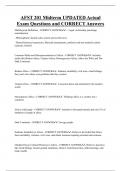AFST 201 Midterm UPDATED Actual
Exam Questions and CORRECT Answers
Multilayered Definition - CORRECT ANSWER✔✔- - Legal: citizenship, parentage,
neutralization
- Philosophical: shared value system and world views
- Shared historical experience: Material (monuments, artifacts) and non material culture
(systems, beliefs)
Common Myths and Misrepresentations of Africa - CORRECT ANSWER✔✔- Includes
myths like Broken Africa, Utopian Africa, Homogeneous Africa, Africa the Wild, and The
Dark Continent.
Broken Africa - CORRECT ANSWER✔✔- Endemic instability, civil wars, ritual killings,
they can't solve there own problems that they created
Utopian africa - CORRECT ANSWER✔✔- A mystical place and untainted by the modern
world
Homogenous Africa - CORRECT ANSWER✔✔- Thinking Africa is a country not a
continent
Africa wild jungle - CORRECT ANSWER✔✔- Animals in Savannah mainly and only 5% of
landmass is jungle in africa
Dark Continent - CORRECT ANSWER✔✔- Savage people
Endemic Instability in Africa - CORRECT ANSWER✔✔- Refers to the belief that Africa
faces instability, violence, civil wars, and ethnic tensions requiring external interventions.
Outdated Socio-Cultural Practices in Africa - CORRECT ANSWER✔✔- Refers to practices
like ritual killings, female genital mutilation, abusive widowhood rites, child marriage, and
bride wealth.
,Homogeneous Africa - CORRECT ANSWER✔✔- Refers to the misconception of Africa
being a single homogenous country.
Africa the Wild/Jungle/Exotic Africa - CORRECT ANSWER✔✔- Misconception that Africa
is a wild and dangerous place, despite only 5% being classified as jungle.
The Dark Continent - CORRECT ANSWER✔✔- Misconception of Africa as a place without
history and civilization, inhabited by 'savage and primitive' people.
What are the 4 kinds of media biases - CORRECT ANSWER✔✔- Personalization bias,
dramatization bias, fragmentation bias, and authority-disorder bias
Personalization bias - CORRECT ANSWER✔✔- Focuses on human interest and emotional
aspect instead of focusing on the broader social and political aspects.
Eg; US sends team to help with Ebola outbreak (insinuates there is an outbreak in all of
Africa even though it was only art of it)
Dramatization bias - CORRECT ANSWER✔✔- Crisis news presented on a Narrative story
telling
eg; famine that affected parts of Ethiopia. Only showed images of malnourished infants even
though it only affected so areas. The visual messages supported stereotypes.
Fragmentation bias - CORRECT ANSWER✔✔- When a complex issue is broken down to be
overly simplistic.
eg; focusing on poverty, conflict, disease, while ignoring economic growth, cultural richness,
etc
Authority- disorder bias - CORRECT ANSWER✔✔- When media tends to show government
and political leaders losing control or restoring order in response to a crisis.
,Eurocentric Views on African History - CORRECT ANSWER✔✔- Claims by Eurocentric
scholars that Africa has no significant history until European arrival, denying African
contributions to civilization.
The empty land myth - CORRECT ANSWER✔✔- States a lot of the land was inhabited
which was an excuse to take land.
Eurocentric scholars include - CORRECT ANSWER✔✔- Arnold Toynbee 1947; Hugh
Trevor-Roper 1963; Tillinghast 1902; Hegel 1965
Hegel's View on African History - CORRECT ANSWER✔✔- G. Hegel's assertion that Africa
has no historical movement or development, attributing historical significance to Asia and
Europe.
Hugh Trevor-roper - CORRECT ANSWER✔✔- Said that Africa should rest in darkness and
that the history was only Eurocentric. Agreed with Hegel.
Davidson's Argument - CORRECT ANSWER✔✔- Africa possesses a history as significant as
any other continent (Basil Davidson).
Myth - Isolated Africa - CORRECT ANSWER✔✔- Contrary to notions, evidence shows
Africa interacted with Asia, Middle East, and Europe.
Ancient Egypt Advances - CORRECT ANSWER✔✔- Developed paper, Hieroglyphs, and
early writing systems.
Hieroglyphs - CORRECT ANSWER✔✔- - Ancient Egyptian script with syllabic and
ideographic elements, deciphered after the 15th century
- represents objects in ancient Egypt
- could represent the sound, or idea of an object
Egyptian Monarchies - CORRECT ANSWER✔✔- Produced early monarchies, known for
monumental architecture and mathematical contributions.
, Egyptian Influence on Greece - CORRECT ANSWER✔✔- Believed to influence Greek
scholars like Pythagoras and Archimedes.
Oral Traditions in Africa - CORRECT ANSWER✔✔- Primary sources include riddles, songs,
storytelling, and myths passed down verbally.
Professional Transmitters - CORRECT ANSWER✔✔- - Include family members, griots, and
word professionals in African oral traditions
- Africans are primarily oral people - ways to tell stories, songs, music, dance
Examples of Traditional Technologies - CORRECT ANSWER✔✔- Architecture, art, pottery
Archaeological Evidence - CORRECT ANSWER✔✔- Includes tools, pottery, and structures
like pyramids.
Archeology and linguistics - CORRECT ANSWER✔✔- Egypt (mummies, tombs, pyramids,
art, etc.);
⚬ Ethiopia (the underground stone city and the mystery Ark );
⚬ Sudan (Nubian civilization);
⚬ Zimbabwe (Great Zimbabwe);
⚬ Mali(recent discoveries of old manuscripts and books from Timbuktu dating back to 1,000
years ago)
Denial of African History - CORRECT ANSWER✔✔- Attempts to disconnect Egypt from
Africa to deny intellectual and scientific debts.
African contributions include: - CORRECT ANSWER✔✔- - Mathematics (Pythagoras
theorem, division, multiplication, circle)
- Astronomy (moon cycles, calendar system, Stonehenge in Kenya)
- medicine (plants)
- pyramids (bilateral trade, movement of people and knowledge)




